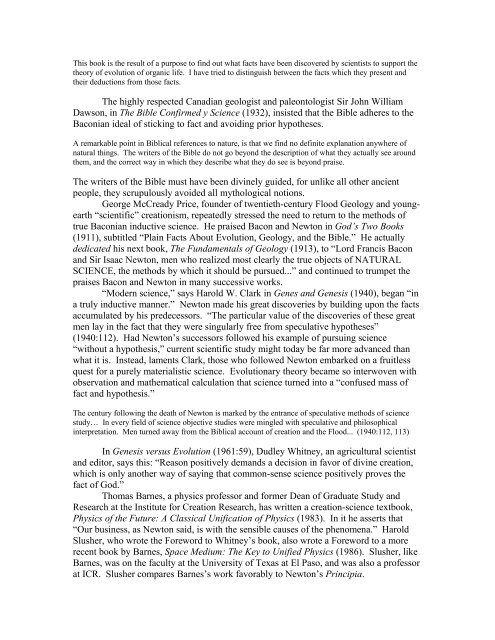Creationism - National Center for Science Education
Creationism - National Center for Science Education
Creationism - National Center for Science Education
Create successful ePaper yourself
Turn your PDF publications into a flip-book with our unique Google optimized e-Paper software.
This book is the result of a purpose to find out what facts have been discovered by scientists to support the<br />
theory of evolution of organic life. I have tried to distinguish between the facts which they present and<br />
their deductions from those facts.<br />
The highly respected Canadian geologist and paleontologist Sir John William<br />
Dawson, in The Bible Confirmed y <strong>Science</strong> (1932), insisted that the Bible adheres to the<br />
Baconian ideal of sticking to fact and avoiding prior hypotheses.<br />
A remarkable point in Biblical references to nature, is that we find no definite explanation anywhere of<br />
natural things. The writers of the Bible do not go beyond the description of what they actually see around<br />
them, and the correct way in which they describe what they do see is beyond praise.<br />
The writers of the Bible must have been divinely guided, <strong>for</strong> unlike all other ancient<br />
people, they scrupulously avoided all mythological notions.<br />
George McCready Price, founder of twentieth-century Flood Geology and youngearth<br />
“scientific” creationism, repeatedly stressed the need to return to the methods of<br />
true Baconian inductive science. He praised Bacon and Newton in God’s Two Books<br />
(1911), subtitled “Plain Facts About Evolution, Geology, and the Bible.” He actually<br />
dedicated his next book, The Fundamentals of Geology (1913), to “Lord Francis Bacon<br />
and Sir Isaac Newton, men who realized most clearly the true objects of NATURAL<br />
SCIENCE, the methods by which it should be pursued...” and continued to trumpet the<br />
praises Bacon and Newton in many successive works.<br />
“Modern science,” says Harold W. Clark in Genes and Genesis (1940), began “in<br />
a truly inductive manner.” Newton made his great discoveries by building upon the facts<br />
accumulated by his predecessors. “The particular value of the discoveries of these great<br />
men lay in the fact that they were singularly free from speculative hypotheses”<br />
(1940:112). Had Newton’s successors followed his example of pursuing science<br />
“without a hypothesis,” current scientific study might today be far more advanced than<br />
what it is. Instead, laments Clark, those who followed Newton embarked on a fruitless<br />
quest <strong>for</strong> a purely materialistic science. Evolutionary theory became so interwoven with<br />
observation and mathematical calculation that science turned into a “confused mass of<br />
fact and hypothesis.”<br />
The century following the death of Newton is marked by the entrance of speculative methods of science<br />
study… In every field of science objective studies were mingled with speculative and philosophical<br />
interpretation. Men turned away from the Biblical account of creation and the Flood... (1940:112, 113)<br />
In Genesis versus Evolution (1961:59), Dudley Whitney, an agricultural scientist<br />
and editor, says this: “Reason positively demands a decision in favor of divine creation,<br />
which is only another way of saying that common-sense science positively proves the<br />
fact of God.”<br />
Thomas Barnes, a physics professor and <strong>for</strong>mer Dean of Graduate Study and<br />
Research at the Institute <strong>for</strong> Creation Research, has written a creation-science textbook,<br />
Physics of the Future: A Classical Unification of Physics (1983). In it he asserts that<br />
“Our business, as Newton said, is with the sensible causes of the phenomena.” Harold<br />
Slusher, who wrote the Foreword to Whitney’s book, also wrote a Foreword to a more<br />
recent book by Barnes, Space Medium: The Key to Unified Physics (1986). Slusher, like<br />
Barnes, was on the faculty at the University of Texas at El Paso, and was also a professor<br />
at ICR. Slusher compares Barnes’s work favorably to Newton’s Principia.

















